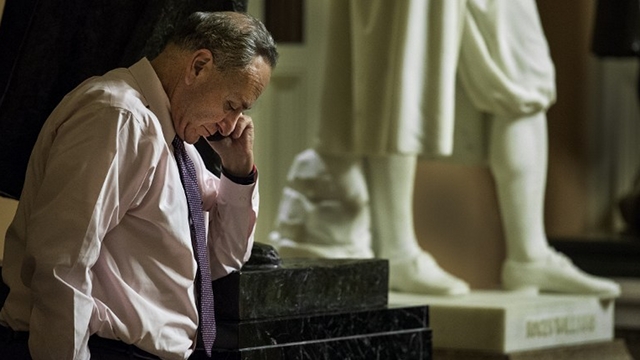SUMMARY
This is AI generated summarization, which may have errors. For context, always refer to the full article.

WASHINGTON, United States of America – A legislative fix to patch up America’s fiscal crisis will be taken up by lawmakers in the Republican-controlled House of Representatives on Tuesday, January 1, after passing the Senate overnight.
The White House and top Republicans struck a deal after dramatic 11th-hour negotiations to avert huge New Year tax hikes and postpone automatic spending cuts that had threatened to send the US economy back into recession.
If the legislation passes the House as expected, it will represent a win for President Barack Obama as it raises taxes on the richest Americans — albeit above an income threshold higher than he and other Democrats had wanted.
But the victory will be hollow as it fails to tackle the deep spending cuts needed to resolve America’s austerity crisis, setting up the prospect of another bitter Washington battle at the start of Obama’s second term.
After months of agonizing over the crisis, weeks of debate about a possible solution, and days of intense, closed-door bartering, the US Senate voted overwhelmingly 89-8 early Tuesday to pass a controversial bill that averts the so-called “fiscal cliff.”
Although the midnight deadline was technically missed, any serious impact on the world’s biggest economy will be avoided as long as legislation passes the House of Representatives in the coming days.
Obama issued a statement shortly after the 2:00 am (0700 GMT) Senate vote, urging lawmakers in the Republican-controlled House to “pass it without delay.” A vote could come as early as Tuesday.
If the measure is agreed by both chambers of Congress, tax rates will be hiked on households earning over $450,000 a year but remain where they are for everyone else.
Major concession for Republicans
While not matching Obama’s campaign threshold of $250,000, it would represent a major concession from Republicans who have stuck solidly to a pledge of no higher taxes since then president George H.W. Bush failed to win re-election in 1992 after breaking a promise not to raise rates.
“While neither Democrats nor Republicans got everything they wanted, this agreement is the right thing to do for our country and the House should pass it without delay,” Obama said in his statement.
The deal puts off $109 billion in budget cuts across the government for two months, setting the stage for a new showdown between Obama’s Democrats and Republicans in dysfunctional Washington at the end of February, just weeks after the president is sworn in for his second term.
Had no deal been struck, experts warned that the fragile US economy could have been sent spinning back into recession due to the $500 billion combined whack of spending cuts and tax hikes.
Pressure on Boehner
It remains for Republican House Speaker John Boehner to rally his restive conservative coalition around the pact, which will likely need some Democratic votes in the House to pass.
For two decades, Republicans have fought any attempt to raise taxes. So White House officials will see vindication in a deal that enshrines one of Obama’s top pledges in his re-election campaign.
In a terse statement, Boehner said his chamber would pick up the legislation if it passed the Senate.
“Decisions about whether the House will seek to accept or promptly amend the measure will not be made until House members — and the American people — have been able to review the legislation,” he said.
Democrats suggested that the deal, like many congressional bargains, was not perfect, but that it was preferable to the alternative.
“It’s not that this proposal is regarded as great or is loved in any way. But it’s a lot better than going over the cliff,” Senator Chuck Schumer told reporters.
World stock markets, expected to be thrown into turmoil by a failure to beat the deadline, are closed New Year’s Day, so lawmakers have a few extra hours of breathing room to get the deal concluded.
What the deal means
The legislation will also extend tax credits for clean energy firms and unemployment insurance for two million people that had been due to expire.
And it includes an end to a temporary two percent cut to payroll taxes for Social Security retirement savings — meaning all Americans will pay a little more — and changes to inheritance and investment taxes.
Relief seemed to course through the Senate during and after the vote, but both sides were already gearing up for the next legislative showdown, over the need to lift the government’s statutory borrowing limit of $16.4 trillion, reached Monday.
The Treasury will take extraordinary measures to keep the government afloat for an undisclosed period of time until the ceiling is raised. Republicans are already demanding spending cuts in return.
That fight will now be doubled as it is likely to coincide with the new deadline for the two-month sequester postponement set up by the fiscal cliff agreement. – Rappler.com
Add a comment
How does this make you feel?





There are no comments yet. Add your comment to start the conversation.